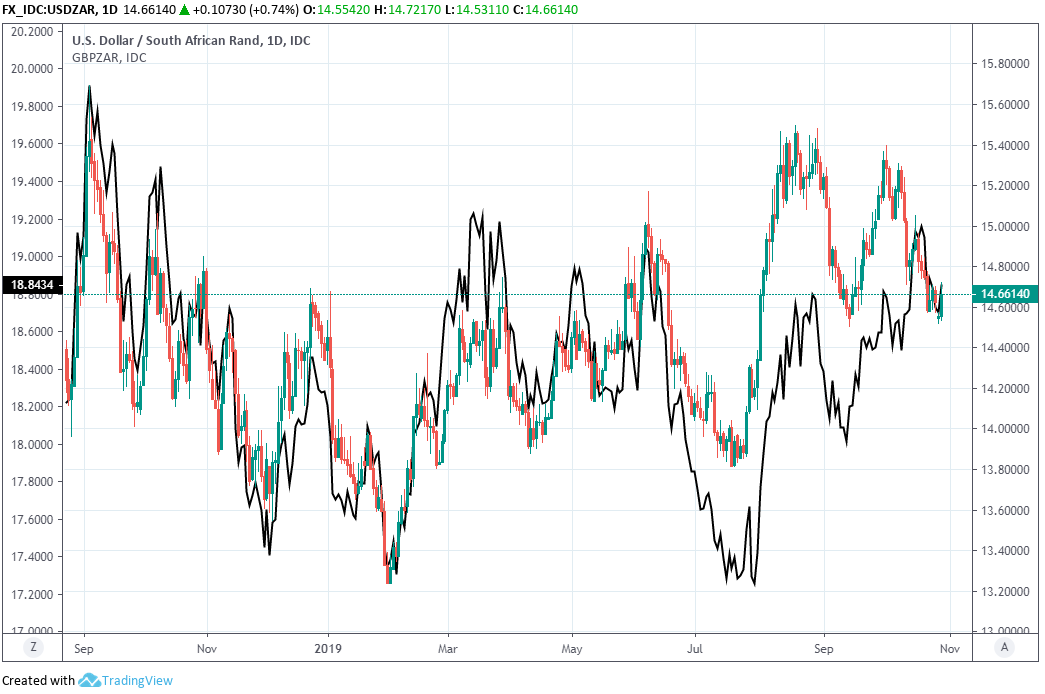The South African Rand Slumps on Unease Over Government Eskom Plan
- Written by: James Skinner

Image © GovernmentZA
- ZAR slides as market reacts to Eskom turnaround plan.
- Long awaited restructuring plan disappoints the market.
- No discussion of Eskom debt sees investors dump ZAR.
- Comes just days ahead of next Moody's rating review.
- RMB sees 14.50-15.0 range in USD/ZAR, UBS sells ZAR.
The Rand slumped Tuesday as investors expressed disappointment with the government's latest plan for turning around the ailing power utility Eskom, which has arguably been seen as too little, too late by a market that's uneasy ahead of Wednesday's budget and Friday's rating decision from Moody's.
Public Enterprises Minister Pravin Gordhan said the damage done to Eskom by 'state capture' was "huge" and "systematic" when unveiling a long awaited blueprint for putting right the national electricity monopoly, which has been threatening the country's purse and credit rating. His address revealed for the first time new measures the government intends to take, although the market reaction suggests they're not enough for investors.
Most notably, Gordhan says the transmission part of Eskom that manages 45,000 lines of cabling, and which has long been tipped for a partial sale to outside investors, will only be partially separated off from the rest of the company. The intention is for the transmission business to become a subsidiary within a broader group structure, which won't necessarily prevent a partial sale of the asset but is obviously a long way short of a privatistion.
It remains to be seen if the plan will be enough to attract the private capital that Eskom and South Africa so badly need however, and on the downside for the Rand, Gordhan said the subject of Eskom's debt will not be addressed until Finance Minister Tito Mboweni's budget is delivered on Wednesday.
"The Eskom announcement didn’t address the crux of the problem, the restructuring of debt. This is likely to be announced in tomorrow’s medium-term budget statement. Today’s rand depreciation is limited in that sense as investors still await guidance on how to price South African debt instruments and the likely impact the current plans will have on Moody’s credit profile assessment," says Simon Harvey, a market analyst at Monex Europe.

Above: USD/ZAR rate shown at hourly intervals, alongside Pound-to-Rand rate (black line, left axis).
Markets were hoping to see on Tuesday, a credible plan for putting right the finances and operations of Eskom, which is a significant threat to the public purse, economy and Rand. At stake is South Africa's last remaining 'investment grade' credit rating, which is the only thing that stands between Rand exchange rates and possible large outflows of foreign capital from the country.
If Moody's cuts the rating in its Friday decision, investors who benchmark to the Citi World Government Bond index will no longer be able to hold South African government debt in their portfolios, meaning they will have to sell their existing investments. President Cyril Ramaphosa has sought to put right the public finances since ascending to the Mahlamba Ndlopfu in February 2018 only his efforts are now being frustrated by the sickly state of Eskom.
"The 14.50 handle on USD/ZAR is aligned to the generalised upswing in global sentiment, but unlikely to endure if the outcomes of the key events over the next few days are perceived negatively. The trading range therefore remains between 20 cents and 50 cents, with the bias to the upside," says Nema Ramkhelawan-Bhana, an economist at Rand Merchant Bank.
The government is on the hook for around Rs450 bn of Eskom's debt, which the company is unable to service due to the sheer scale of the liability as well as years of underinvesment that are now hampering its ability to generate sufficient revenue. All of this makes an already precarious taxpayer balance sheet even more stretched, while testing the patience of Moody's.

Above: USD/ZAR rate shown at daily intervals, alongside Pound-to-Rand rate (black line, left axis).
The government will deliver its budget Wednesday and has a track record of disappointing the markets with its finance updates, while Eskom's February bailout means the public balance sheet was always expected to have deteriorated more significantly this time anyway. UBS told clients this week to sell the Rand ahead of the budget.
"UBS Strategy expect rand’s underperformance relative to high carry peers (RUB, IDR, MXN) to continue as they believe the currency does not fully price in the degree of fiscal deterioration expected by year end," Chrissie Loedolff, a multi-asset class salesperson at UBS. "With positioning a lot cleaner, potential further negativity out of the budget next week and possible Moody's downgrade, current levels in USDZAR offers good risk reward to buy."
South Africa's government said in February the budget deficit would likely be around 4.2% of GDP this year and 4.5% the following year, which was already bad enough for the ratings agencies Moody's. National debt has crossed above 60% of GDP and the budget deficit is still rising while there's now only one major rating agency that has the country as an 'investment grade' prospect, Moody's.
Moody's has criticised the government for repeated failures to stem the increase in the deficit but it still has a positive outlook on the rating. Its staff said recently the agency would likely change the outlook before issuing any downgrade, but some say this won't necessarily spare the Rand Friday.
Time to move your money? Get 3-5% more currency than your bank would offer by using the services of a specialist foreign exchange specialist. A payments provider can deliver you an exchange rate closer to the real market rate than your bank would, thereby saving you substantial quantities of currency. Find out more here.
* Advertisement




